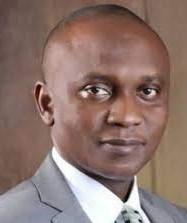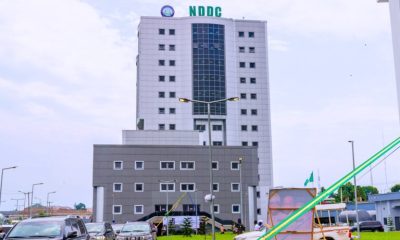COVER
Union Accuses CAC Registrar General of Abuse of Power

From Ankeli Emmanuel, Sokoto
The Amalgamated Union of Public Corporations, Civil Service Technical
and Recreational Services Employees (AUPCTRE) has accused the
Registrar General of Corporate Affairs Commission (CAC), Alhaji Garba
Abubakar of abuse of power and high handedness.
The Union in a petition dated January 11, 2021 signed by acting
Secretary General, Musa Ukpo and addressed to the Chairman, Code of
Conduct Tribunal, accused Alhaji Garba Abubakar of allegedly
committing financial impropriety, commercialising promotion exams and
inflating contracts as well as consultancy fees.
The said petition marked AUP-NS/CCB/Vol.1./02 also drew the attention
of the Director, Investigation and Monitoring of the Code of Conduct
Tribunal.
Part of the petition read in part: “Staff of the Corporate Affairs
Commission (CAC) under the auspices of Amalgamated Union of Public
Corporations, Civil Service Technical and Recreational Services
Employees (AUPCTRE) have petitioned the National Assembly and the Code
of Conduct Bureau (CCB) and the Presidency over allegations of
corruption and victimisation against the Registrar-General, Alhaji
Garba Abubakar”.
The petition added that, “It has been discovered that the Registrar
General of CAC, allegedly used a front company called the Eminent
Konsult of Centage Avenue, Ikeja, Lagos, to inflate consultancy fees
for tax reconciliation on FCT Abuja Payee Tax Liability for 2018 and
2019 at an exorbitant amount of N43,072,046.67 via PV no. 131817/2595
and PV no. 181818/2596 both dated 13th August, 2020 respectively.
“There is an alleged financial impropriety with regards to the cost
fees of training of board members to the tune of N63,769,5000 million.
The payments were made to Major Academy Ltd of No. 22, Isyaku Avenue,
off Liberia street, Kaduna State in two installments. The first was on
the 13th July, 2020 with PV no. 111290/2206 where N31,023,000 million
was paid while the other payment was made to same company on the 14th
July, 2020 with PV no. 120368/2206 to the tune of N32,746,500
million”.
The union further alleged that the Registrar General of CAC also
awarded contract for the procurement of Server DL 560 Gen 108SFF to
Descacio Limited in Lagos for over N87 million and another N98 million
for the procurement of the Company Registration portal (CRP) software
and provision of software support and maintenance to Oasis Management
Company Ltd in Abuja.
AUPCTRE further alleged that the Registrar General also awarded a
contract of over N2million to Muhal Global Concept Ltd for work tool
for the office of the Registrar General.
They also accused him of taking unilateral decisions in matters that
affect staff welfare hence leading to stagnation, alteration of
promotion policies, refusal to pay staff promotion arrears of 2019
despite the availability of funds and budgetary provisions, stoppage
of all staff loans schemes, including those of the cooperative
societies as well as coercing of staff to forcefully resign their
membership of the union and imposing on them the membership of another
union of his choice, in addition to carrying out auctions of
unserviceable/obsolete vehicles of the CAC without due process hence
in breach of the Constitution.
“The promotion examinations for 2019 and 2020 in the commission were
commercialised. Vacancies were not declared in Human resources and
Finance departments in the appropriation year yet he filled the
Vacancies with his favourites against the budgetary provision, thus a
breach of the appropriation act.”
AUPCTRE in a second petition to Prof Ibrahim Gambari, the Chief of
Staff to President Muhàmmadu Buhari, dated 5th of March, 2021, the
union alleged that the Director General of CAC, Alhaji Garba Abubakar
illegally dissolved the union and banned all it’s activities.
The petition titled ” The struggle of AUPCTRE against corrupt
practices on public service with a special focus on CAC” was signed by
the acting General Secretary, Musa Ukpo where the union again accused
the Registrar General of “illegally dissolving the union executive and
banning them from operating and transfer of all executives to
different parts of the country to weaken the union.
“The Registrar General, it was gathered that while the nation was
under lockdown during the COVID-19 pandemic allegedly siphoned over
N30 million on grounds that he has organised a training workshop for
staff that were working from home then.
“As if that wasn’t enough, the Registrar however, went ahead to spend
another whooping sum of N35 million fumigating the agency’s
environment because of the COVID-19 pandemic in addition to
contracting someone to paint the Zone 5 annex office of CAC for
N30,246,979.63 million as well,” The Union alleged.
Meanwhile attempt to get reaction from the Registrar General failed as
a letter addressed to him by DAILY ASSET to respond to some of the
allegations, was not replied to two weeks after.
COVER
CBN Records N165bn Surplus in 2024

By Tony Obiechina, Abuja
The Central Bank of Nigeria (CBN) has recorded a surplus of N165 billion in 2024 as its bottom-line improved from a deficit position of N1.3trn in 2023.This was contained in its financial statement just released by the apex bank and the 2024 Financial Position Indicates Improved Performance.
According to the apex bank, the turnaround is a direct consequence of effective containment of expenditure, gains on investments made by the Bank and increased income from foreign exchange transactions. The 2024 financial statement also reflects the Bank’s commitment to economic stability, sound policy implementation, and strategic financial management, highlighting improvements in external reserves, asset quality, cost efficiency and overall bottom-line improvement.The External Reserves recorded an increase from $36.6bn in 2023 to $38.8bn in 2024. This is largely attributable to improvement in accretion to external reserves from portfolio investors, diaspora remittances and Federal Government receipts following improvement in the confidence in the economy, facilitated by better coordination with the Nigerian National Petroleum Company (NNPC) and diaspora engagement strategies. Also, proper investment management decisions aimed at boosting the reserves of the Bank.This performance reflects the CBN’s firm commitment to external sector stability, ensuring Nigeria is better positioned to meet its international obligations, stabilize the Naira, and boost macroeconomic confidence.The financial statements also show a notable reduction in loans and receivables from N16.1trn to N11.9trn. This is primarily attributed to significant recoveries from earlier intervention lending programs, a deliberate policy shift away from intervention lending and monetary financing through ways and means in line with the Bank’s new stance on allowing market mechanisms to drive credit allocation and financial sector development.The Bank also said other Operating Expenses in 2024 were well-managed and optimized, reflecting a cost-conscious culture. This was achieved through strategic cost rationalization initiatives, including reduction in non-essential spending and streamlined operations across regional branches and departments.In line with the Financial Reporting Council (FRC) regulatory requirement on ICFR, the Central Bank was able to carry out an assessment of its internal controls which was further certified effective by the joint external audit team.As a testament to the effectiveness of this initiative, the joint external auditors issued an independent assurance report declaring the Bank’s ICFR framework to be “effective” for the 2024 reporting period.While the Bank’s 2024 financial results reflect operational improvements, some expenditure lines posed challenges.One of the notable upticks in the Bank’s expenses in 2024 was related to liquidity management operations. These costs rose to N4.5trn from N1.5trn in 2023. This increase was in tandem with the tightening monetary policy stance adopted to combat inflationary pressures throughout the year. In pursuit of that the Bank conducted more frequent and higher-value Open Market Operations (OMO) to mop up excess liquidity arising from fiscal injections at a significant cost.This is a responsibility the CBN is carrying out on behalf of the Federation, in some jurisdictions; this cost is borne by the Government.The financial statements also reflect an increase in the loss on settled derivative contracts during the year from N6.3trn in 2023 to N13.9trn in 2024. This development is a direct consequence of the high volume of derivative contracts settled by the Bank in 2024. These are legacy transactions which the current management met on resumption of their office. This proactive settlement effort was undertaken as part of management’s broader strategy to Reduce outstanding foreign exchange liabilities, thus lowering its FX exposure, boost net foreign reserves, thereby improving Nigeria’s external buffer and investor confidence, restore credibility to Nigeria’s forward markets and address legacy obligations transparently.The improved performance of the Central Bank of Nigeria in 2024 is not coincidental but a product of deliberate and strategic management efforts.With these developments, the Bank’s leadership has reinforced governance and accountability, instilled operational discipline, and pursued a balanced monetary policy stance, ensuring price and financial system stability.According to the Bank, these reforms have collectively repositioned the CBN as a credible monetary authority, with its 2024 financial results serving as proof of its unwavering resolve to support economic recovery, safeguard financial stability, and build public trust.COVER
Nasarawa Tiv Farmers Stage Protest over Alleged Land Seizure

By Abel Zwànke, Lafia
Tiv farmers from various communities in Obi Local Government Area of Nasarawa State yesterday, staged a protest against forceful seizure of their ancestral lands by the state government.They also accused the state Government of deliberate refusal to seek their consent before embarking on any activity on their legitimate land.
Part of their demands during the protests were calls for justice and a message to the state Governor, Abdullahi Sule to immediately halt all processes so far taken on the disputed land. The protesters, drawn from Ayakeke, Osula, China, Shankodi, Udugh, Ikychiha, Utsuwa and Daura communities, had earlier expressed their frustration during the governor’s visit to inspect farmlands intended for the 2025 farming season.Benjamin Tyoga, who spoke on behalf of the protesting group, said the lands in question have been in the possession of their forefathers for hundreds of years and any attempt to take them without proper dialogue will amount to oppression and illegality.“We don’t believe the governor’s words because the land belongs to our fathers, hundreds of years ago. If it is to be taken, we should have been consulted—not just for him to come and inspect and talk to us because we are protesting.“He said we should send our leaders, but we are the people—all of us here. Why can’t he talk to us directly? It is not fair. This is purely a seizure of our lands by force,” he added.Tyoga further argued that infrastructure developments such as roads, will mean nothing if the people are deprived of their main source of livelihood which is farming.“If you create roads and we don’t have what to eat to survive, what have you done? We are predominantly farmers, and we want the governor to consider the fact that we are citizens of Nasarawa State. We have the right to protest and demand for things that belong to us,” he said.He lamented the difficulty involved in having access to the Governor when they need him the most, stressing that the protest provided a rare opportunity for a direct engagement, which the governor did not fully utilize.He maintained that “Engineer Sule is the governor, but meeting him is difficult. This is an opportunity to talk to us in a language we understand. But what he did was to say we should send our leaders to meet him.”How do we get to him? We are calling on the Governor to leave our land. If he wanted to speak to us, he would not have come first to see the lands before calling to see us. If not for our protest, he wouldn’t have even talked to us. We will not rest until justice is served,” Tyoga stated.Another protester, Terhemba Iveren, echoed the same concerns.According to him, “This is not just land; this is our identity, our history, our home.”You cannot just come and take it without talking to us directly. We are not saying we don’t want development, but let it not come at the cost of our survival,” she said.In his response to the protesters Earlier, Governor Abdullahi Sule cautioned the farmers against inciting unrest and urged them to channel their grievances through recognized leadership.His words, “Send your leaders to represent you to speak to me. Don’t send troublemakers because if you send troublemakers, you all will be in trouble,” Governor Sule warned.He assured the people that the initiative is in their best interest and not a personal venture.“I am the first governor to visit your community and even Jangwa.”There are other things we intend to do for you, good roads and other infrastructure that will better your community. The farm is not my personal property but for the people of Nasarawa State, including you. That is why I came here myself to see things,” he said.The governor maintained that the farmland project is already attracting investment and emphasized that, legally, all land belongs to the state government.“All lands belong to the state government. We can only allow and give time for those that have economic trees, and if need be, we will compensate,” he explained.Despite the assurances, local elders and community members expressed dissatisfaction with the handling of the matter. Elder Iorliam Aondofa called on the governor to organize a town hall meeting for more inclusive dialogue.“The governor must return with his team to genuinely meet with us—not just visit our land and leave. Let there be a town hall meeting where everyone can air their views. That is how democracy works,” Aondofa said.Several other farmers confirmed they were not officially informed about the project and that they were shocked when government officials began visiting their land.“They just came one day and said the land is for a government farm project. That is not how things should be done,” said Terver Gbakough, a young farmer. “We deserve respect and fairness. If there is any plan to take land, it must be with our full knowledge and agreement.”Human rights advocates in the state have begun raising concerns. Comrade Isaac Gbande, a land rights activist, warned that the government’s approach could lead to long-term conflict.“This is not just a policy issue, it’s a human rights matter,” Gbande said. “The government must follow the principles of free, prior and informed consent before displacing any community, even for development purposes. Anything short of that will create long-term resentment and resistance.”Security operatives present at the scene were able to keep the situation under control as tensions ran high. Observers have since called for a more transparent and community-inclusive approach moving forward.For now, the protesting Tiv farmers have vowed to continue demanding justice and recognition of their ancestral rights.“We are not against development,” Benjamin Tyoga concluded. “We are against the injustice of being ignored, displaced, and spoken to like we don’t matter. All we ask is to be treated with respect and fairness in our own state.”COVER
World Bank: 75.5% Rural Nigerians Live Below Poverty Line

By David Torough, Abuja
The World Bank has disclosed that a staggering 75.5 percent of rural Nigerians are now living below the poverty line, reflecting deepening hardship in the country’s hinterlands.
This was revealed in the Bank’s April 2025 Poverty and Equity Brief for Nigeria, which paints a grim picture of worsening economic hardship, widening inequality, and persistent underdevelopment across much of the nation.
While poverty is widespread among urban populations, the report emphasised that the situation is significantly worse in rural areas, where economic stagnation, high inflation, and insecurity have exacerbated living conditions.
“Based on the most recent official household survey data from Nigeria’s National Bureau of Statistics, 30.
9 per cent of Nigerians lived below the international extreme poverty line of $2.15 per person per day in 2018/19 before the COVID-19 pandemic,” the report stated.The report also highlighted Nigeria’s enduring regional disparities. “Nigeria remains spatially unequal. The poverty rate in northern geopolitical zones was 46.5 per cent in 2018/19, compared with 13.5 per cent for southern ones. Inequality measured by the Gini index was estimated at 35.1 in 2018/19.
“Nigeria’s Prosperity Gap — the average factor by which individuals’ incomes must be multiplied to attain a prosperity standard of $25 per day for all — is estimated at 10.2, higher than most peers.”
Despite successive policy interventions, these figures underscore a persistent economic divide across the country.
The report’s demographic analysis found that children aged 0 to 14 years had a poverty rate of 72.5 per cent, reflecting the scale of deprivation among the youngest segment of the population.
Gender disparities were also observed, with 63.9 per cent of females and 63.1 percent of males classified as poor under the $3.65 per day lower-middle-income threshold.
Education emerged as a significant determinant of poverty, with Nigerians lacking formal education experiencing a poverty rate of 79.5 percent. This contrasts with 61.9 percent for those with primary education and 50.0 percent for secondary school graduates. Only 25.4 percent of those with tertiary education were considered poor.
The report also drew attention to multidimensional poverty indicators, which further reflect widespread deprivation.
According to the World Bank, about 30.9 percent of Nigerians live on less than $2.15 daily, 32.6 percent lack access to limited-standard drinking water, 45.1 percent do not have limited-standard sanitation, and 39.4 percent have no electricity.
Education access remains a challenge, with 17.6 percent of adults yet to complete primary education, and 9.0 percent of households reporting at least one school-aged child not enrolled in school.
The report noted that even before the COVID-19 pandemic, efforts to reduce extreme poverty had largely stalled.
“Before COVID-19, extreme poverty reduction had almost stagnated, dropping by only half a percentage point annually since 2010. Living standards of the urban poor are hardly improving, and jobs that would allow households to escape poverty are lacking,” the report read.
Although the World Bank acknowledged recent economic reforms aimed at stabilising Nigeria’s macroeconomic outlook, it warned that persistently high inflation continues to undermine household purchasing power, particularly in urban areas where incomes have not kept pace with rising costs.
In light of the worsening situation, the Bank called for urgent policy action to shield vulnerable groups from inflationary shocks and to drive job creation through more productive economic activities.
















